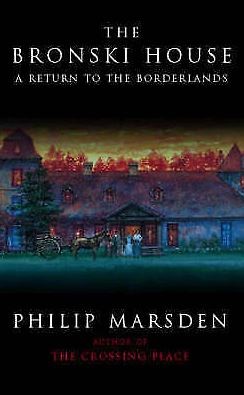Bronski House: A Return to the Borderlands - Philip Marsden

The Bronski House: A Return to the Borderlands
Philip Marsden
2005
ISBN 0007204523
London: Harper Perennial
98 Books about Poland | Polish War Graves in Britain
For 53 years Zofia Ilinska had not seen her native Poland. In September 1939 when the Nazis and the Soviets invaded Poland she and her family fled the country. Her mother, two brothers and the 17 year old Zofia left their home in Eastern Poland on farm carts. They headed through the forests for three days, just ahead of the advancing Soviet troops, and crossed into Lithuania while under fire from Soviet riflemen. They eventually settled in Britain. In 1989 the Berlin Wall fell and in 1992 Zofia, accompanied by her friend Philip Marsden, made a return journey back to her former Polish home now part of Belarus.
The Bronski House is the story of Zofia's search for her family home and the hoard of silver she and her mother buried in the forest just before they fled. It is also the story of Helena Bronska, Zofia's mother, who in her letters, notebooks and diaries recorded her life in Poland between the two world wars. It tells of their escapes from Bolsheviks and Germans at the end of the 1st world war, during the Polish-Soviet war of 1920 and at the start of the 2nd world war. It details how they rebuilt their manor house beside the river Niemen, near the Russian border, after it was burnt down and of the life they had on their lands.
On the day that Helena was married, 14 July 1920, the Red Army took control of Wilno (now Vilnius in Lithuania). No one from her husband's family was able to attend the wedding ceremony in Platkow. Adam, her husband, was shortly afterwards interned by the Lithuanians but managed to escape. Helena and Adam then fled, first to Gdansk, then Warsaw. Adam then rejoined his regiment the 13th Uhlans.
The Red Army was closing in on Warsaw: six armies, more than 100,000 men, were moving rapidly towards it. All attempts to slow them had failed. Poland's brief independence was being shattered...Pilsudski (Polish commander-in-chief) realized the only hope of defence was attack...Polish troops...cut off the Red Army from the rear...The Miracle on the Vistula was a decisive victory...By October 1920, an armistice was called and Poland found itself with an eastern border more than 500 miles long. Lord D'Abernon said: ... it is probable that the Battle of Warsaw saved Central and parts of Western Europe from the fanatical tyranny of the Soviet...It proved only a respite, a 20 year respite in which the landed families of Eastern Poland carried on living much as before. (pp. 137-139)
Obituary
Zofia Ilinska, born in Wilno 29 October 1921, died St Austell, Cornwall, 30 October 1995.
Philip Marsden, The Independent (London) 3 November 1995, wrote:
Her early years were austere. The family house had been burnt down during the Polish-Soviet war and the land around it was devoid of horses, cattle, grain, almost any food at all; Zofia's mother fed her on goat's milk while her father, Aleksander Brochocki, started to rebuild the house. They lived simply; there was never electricity, and furniture was built largely from the birch forests that surrounded the estate...In 1943, while working at the Polish section of the BBC, she married Olgierd Ilinski, a pilot. Within three weeks of the wedding, his plane had been shot down over France. At 23, Zofia Ilinska was a widow...Contented though she was in exile, Ilinska remained essentially Polish and always curious about her old home... in 1992, after 53 years, she returned to the newly independent republic of Belarus.